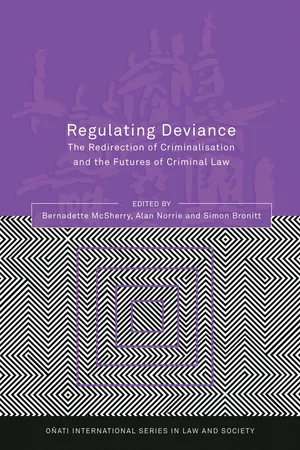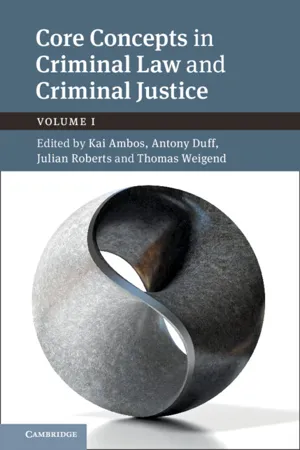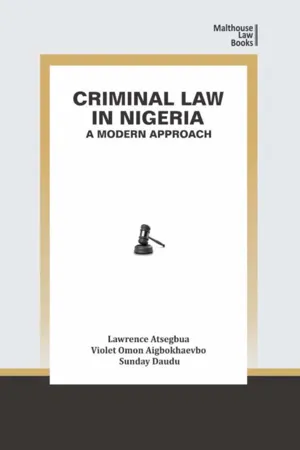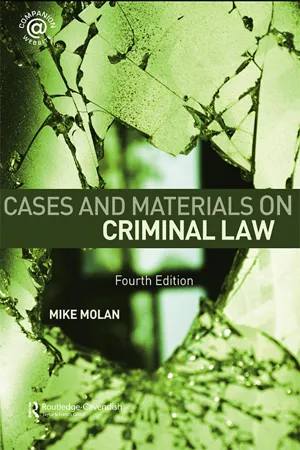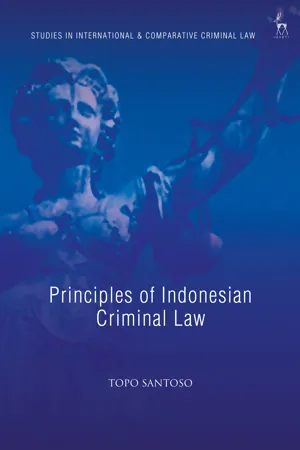Law
Preliminary Offences
Preliminary offences refer to acts that are committed before the commission of a main offence, often with the intention of facilitating or preparing for the main offence. These acts may include conspiracy, attempt, or aiding and abetting. In legal terms, preliminary offences are considered as serious as the main offence and are punishable accordingly.
Written by Perlego with AI-assistance
Related key terms
1 of 5
5 Key excerpts on "Preliminary Offences"
- eBook - PDF
Regulating Deviance
The Redirection of Criminalisation and the Futures of Criminal Law
- Bernadette McSherry, Alan Norrie, Simon Bronitt, Bernadette McSherry, Alan Norrie, Simon Bronitt(Authors)
- 2008(Publication Date)
- Hart Publishing(Publisher)
This evidentiary problem brings the argument back full circle to the necessity of proving an intention to commit the substantive offence. Preparatory offences can really only be justified on the basis of police intervention to prevent future harm occurring, but this should be based on inferences as to the likelihood of effectively preventing the wrong-ful conduct. Frederick Schauer and Richard Zeckhauser point out that ‘mild’ forms of regulation by generalisation may be justified in turning on probabilistic inferences, but ‘it may be unacceptable for such probabilistic generalizations to provide the basis for imprisoning or fining people who might be wholly innocent’. 100 In Dubber’s view, possession offences reflect an approach to criminal law that emphasizes crime control over just pun-ishment, application over definition, results over rules, and ultimately the protec-tion of state authority over the prevention and vindication of personal harm. 101 The same must be said of preparatory offences. V. THE PUNISHMENT FOR PREPARATORY OFFENCES If Dubber’s approach is correct and preparatory offences indicate that the Police Power Model is now the paradigm model of criminal process, indicating 98 Ashworth, above n 67, at 737. 99 DN Husak, ‘Reasonable Risk Creation and Overinclusive Legislation’ (1998) 1 Buffalo Criminal Law Review 599; DN Husak, ‘Guns and Drugs: Case Studies on the Principled Limits of the Criminal Sanction’ (2004) 23 Law and Philosophy 437. 100 Schauer and Zeckhauser, above n 12, at 75. 101 Dubber, above n 11, at 117. Expanding the Boundaries of Inchoate Crimes 161 such offences are here to stay, what should the punishment be for such offences? The penalty for the United Kingdom and Australian preparatory offences is life imprisonment. 102 In Canada, facilitating a terrorist activity is punishable by imprisonment for a term not exceeding 14 years. - eBook - PDF
- Kai Ambos, Antony Duff, Julian Roberts, Thomas Weigend, Alexander Heinze, Alexander Heinze(Authors)
- 2020(Publication Date)
- Cambridge University Press(Publisher)
See: Roxin, Strafrecht I (2006), § 2 mn. 97; Hassemer and Neumann, ‘Vorbemerkung zu § 1’ (2017), mn. 72; Kasper, Verhältnismäßigkeit und Grundrechtsschutz (2014), 243. See, also, BVerfGE 39, 1, 47; Jareborg, ‘Last Resort’ (2005). Cf. Husak, ‘Last Resort’ (2004). 23 Difficult questions arise regarding what ‘less intrusive’ means here (including the types of procedure utilised). See generally Ashworth et al., Prevention, and the sources cited in Bock and Harrendorf, ‘Strafbarkeit und Strafwürdigkeit’ (2014), 374. II Some Examples of Preparatory Offences Before discussing examples of preparatory offences from England and Wales, and Germany, it should be noted that the practical boundaries of preparatory offences are set in two distinct ways. The focus here is on the limits of offence definitions, which – in Germany 24 – should (as a rule) mean the range of prosecution. In contrast, English law makes use of prosecutorial discretion in the ‘public interest’. 25 The ‘substantive’ crim- inalisation of preparatory conduct will thus depend to varying extents on police and prosecutorial discretion. What is said below concerns the ‘formal’ criminalisation of preparatory conduct – ‘the law in the books’. 26 English law has two general offences of preparation: encouraging or assisting crime (a tag for three ‘disturbingly wide’ 27 offences under the Serious Crime Act 2007 (SCA 2007)) and statutory conspiracy. 28 The SCA 2007 offences replaced the general offence of incitement. - eBook - PDF
- Lawrence Atsegbua, Violet Aigbokhaevbo, Sunday Daudu(Authors)
- 2022(Publication Date)
- Malthouse Press(Publisher)
Section 4 of the Criminal Code 2 provides that: when a person intending to commit an offence, begins to put his intention into execution by means adopted to its fulfilment and manifests his intention to such an extent as to commit the offence, he is said to attempt to commit the offence. On its part, section 95 of the Penal Code 3 provides among others that whoever attempts to commit an offence punishable with a term of imprisonment or with a fine shall be so punished with such a fine or both. In effect, the Penal Code punishes an attempt to commit a crime. In England, there are many other offences that might qualify as inchoate offences in the sense that they penalise conduct that might be preparatory to the commission of other offences, for example possession of firearms. 4 In English Law, attempt is a crime in itself, as it is indictable as such without reference to any further offence. However, only about 20 per cent of attempts are ever reported to the police and therefore the proportion coming through the courts is much smaller. It is speculated that about half of the attempts failed because the level of security, and that the proportion of attempts has increased in recent years. 5 To constitute an offence in the Nigerian context, the act of the accused person must be immediately connected with the commission of the particular offence and must be something more than mere preparation for the commission of the offence. 6 2 Cap C 34 Laws of the Federation of Nigeria 2004 3 Cap P 3 Laws of the Federation of Nigeria 2004 4 Sections 16-22, The English Firearms Act 1968 5 Molan M., et al, Modern Criminal Law, 5 th ed, (London, Cavendish Publishing Ltd) (2003) 159 6 Jegede v. The State (2001) 14 NWLR (pt 733) 264 SC Criminal Law in Nigeria: A Modern Approach 72 THE LAW ON ATTEMPTS THE LAW ON ATTEMPTS THE LAW ON ATTEMPTS THE LAW ON ATTEMPTS It is now a settled law that, where a crime is attempted, there is a harm and a threat to life and security. - eBook - ePub
Cases & Materials on Criminal Law
Fourth Edition
- Mike Molan(Author)
- 2009(Publication Date)
- Routledge-Cavendish(Publisher)
Chapter 8 Inchoate OffencesDOI: 10.4324/9780203885833-8Contents
- 8.1 Introduction
- 8.2 Incitement
- 8.3 Statutory Conspiracy
- 8.4 Attempt
- 8.5 Doubly Inchoate Offences – Inciting Incitement
8.1 Introduction
The three forms of liability for inchoate offences in English criminal law are incitement, conspiracy and attempt. In each case liability can be imposed on the defendant even though the completed offence is not committed (inchoate simply means incomplete).There are broadly two justifications for such offences. The first can be encapsulated in the notion that prevention is better than cure. To intervene and arrest whilst a bombing campaign is being discussed, agreed or arranged, is far better than to deal with its aftermath. The second is based on the argument that by suggesting, agreeing to commit, or trying to commit a crime a defendant has demonstrated his willingness that the crime should be committed. Therein lies the culpability that justifies punishment. In that sense it matters not whether the completed crime is ever committed. There is a further practical matter that should not be overlooked. Even where there is evidence that a completed offence has been committed, it may be easier for the prosecution to secure a conviction for incitement, conspiracy or attempt to commit the crime. The prosecution is at liberty to take this course of action, provided the indictment does not allege an inchoate and completed form of the same offence.8.2 Incitement
To incite another to commit a criminal offence is itself an offence at common law. The offence requires proof that: - eBook - PDF
- Topo Santoso(Author)
- 2023(Publication Date)
- Hart Publishing(Publisher)
However, it remains important for the public prosecutor because the core part of the offence, the actus reus, must be included in the indictment and must be proven. If it is not proven, then the perpetrator cannot be found guilty of crimi- nal charges. While criminal liability (the existence of fault) does not need to be indicted and does not need to be proven by the public prosecutor, if the defendant or legal counsel can prove that there is no fault, then the perpetrator is acquitted from all criminal charges. 27 Sudarto also argues that there are no principal differences in determining the existence of a crime. However, if a person adheres to one theoretical position, they should hold that position consistently to avoid confusion. So, when using the term ‘criminal offence’, it must be clearly understood what is meant; that is, according to a monistic or dualistic view. For people who take a monistic view, if someone commits a crime this is sufficient for them to be punished, while for dualistic view holders, this is not at all sufficient because the act must also be accompanied by the conditions establishing the criminal responsibility of the perpetrator. 28 In my opinion, a criminal offence is an act or series of actions, or failure to commit an act, committed by an individual or a corporation, which is against the law and which can be carried out under certain circumstances or accom- panied by certain results, and the act or series of actions, or failure to commit the act, is sanctioned with punishment and/or actions according to laws and regulations. This understanding includes a broader subject, covering not only humans but also corporations. A criminal offence is always against the law. I state ‘an act or a series of actions’ here considering that a crime can be carried out through one action or through a series of actions.
Index pages curate the most relevant extracts from our library of academic textbooks. They’ve been created using an in-house natural language model (NLM), each adding context and meaning to key research topics.
